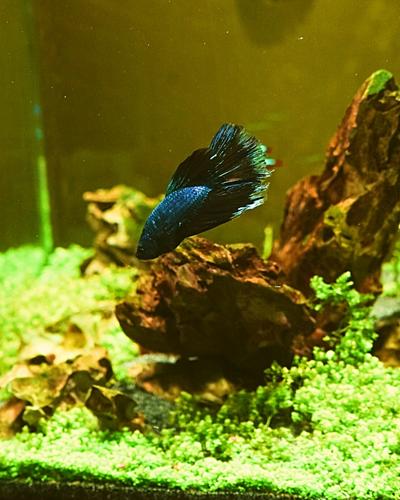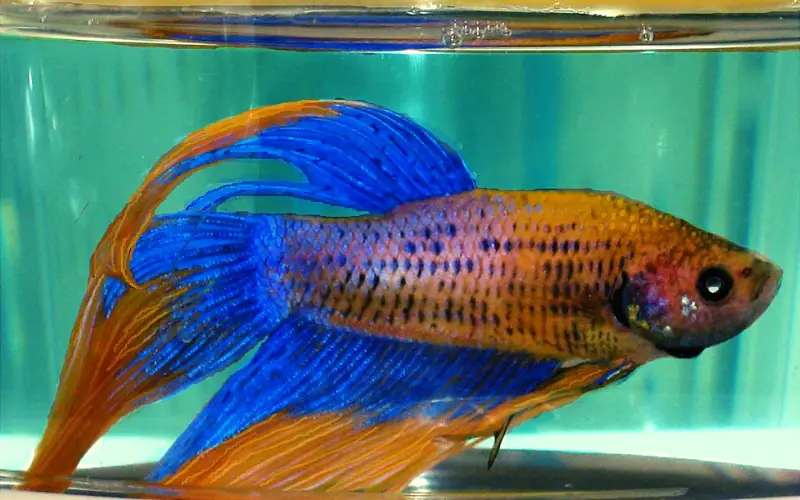What causes Betta fish fin loss? Betta, or Siamese fighting fish, are popular pets for their vibrant colors and flowing fins. However, one common issue betta fish owners may encounter is fin loss.
Whether it is due to disease, injury, or environmental factors, fin loss can be distressing for both the fish and their caretakers.
In this article, we will delve into the causes of betta fin loss and provide tips for care and prevention.

Understanding the potential causes of betta fish fins and tail loss is crucial for providing the best care for these beautiful creatures. From fin rot to aggressive betta fish tank mates, various factors can contribute to fin loss in betta fish.
Additionally, knowing how to properly care for a betta fish that has experienced fin loss is essential for their overall health and well-being. Finally, preventing fin loss in the first place is vital to ensuring a happy and healthy life for your betta fish.
Join us as we explore the world of fin loss betta and learn how to support these captivating aquatic pets best.
Table of Contents
ToggleWhat Is Betta Fin Loss?
Betta fin loss is the partial or complete disappearance of a betta fish’s fins, especially the tail fin. It can be a worrying sight for betta owners, as healthy bettas have large, flowing fins that are a significant part of their beauty and swimming ability.
If your betta is losing its fins, taking action immediately is essential. The first step is to identify the cause of the problem. Once you know what’s causing the fin loss, you can take steps to treat your betta fin loss.
What Causes Fin Loss in Betta Fish?
There are several reasons why a betta might lose its fins, and the cause will determine the best course of action. Here are some of the most common causes:
- Fin rot: This is a bacterial infection that eats away at the fins, causing them to appear ragged, discolored, and frayed. Fin rot is often caused by poor water quality, stress, or injuries.
- Tail biting: Bettas are known for their territorial behavior, and sometimes they will bite the fins of other fish, including their own. This can be caused by stress, boredom, or overcrowding.
- Physical injury: Bettas can injure their fins by snagging them on decorations or tank mates. This is more likely to happen if the tank has sharp objects or rough surfaces.
- Chemical burns: Exposure to harsh chemicals, such as ammonia or chlorine, can burn a betta’s fins. This is most likely to happen if the water in the betta tank is kept the same regularly.
Betta Fish Fin Loss vs. Betta Fin Rot (Differences)
Fin rot and fin loss are two common problems that can afflict betta fish, but they have different causes and require other treatments.
It’s important to note that bettas fin loss can sometimes lead to fin rot if the damaged tissue becomes infected. So, monitoring your betta fish closely and taking action if you see any signs of infection are essential.
If you’re unsure whether your betta fish has fin loss or fin rot, it’s always best to consult a veterinarian or experienced aquarist. They can help you diagnose the problem and recommend the best betta fish fin loss treatment.
Here’s a breakdown of the key differences between Fin rot and fin loss:
Here are some additional tips for diagnosing fin loss vs. fin rot in betta fish:
Fin loss is often caused by:
- Sharp tank decorations or substrate
- Tank mates that nip fins (such as barbs or tetras)
- Rough handling
- Water currents that are too strong
Fin rot is often caused by:
- Poor water quality (such as high ammonia or nitrite levels)
- Overcrowding
- Stress
- Injuries that become infected
If you are unsure whether your betta fish has fin loss or fin rot, it is always best to err on the side of caution and treat for fin rot. Early treatment is essential for preventing the infection from worsening.
Do Betta Fins Grow Back?
Yes, betta fins can grow back under the right conditions. Betta fish species can regenerate their fins. However, it may take time and proper care.
Fin regrowth can occur if the betta fish is placed in clean, warm tank water with proper water parameters. It is essential to keep the water quality high and maintain a stable environment for the fish to help with fin regrowth.

How to treat betta fish fin loss? A balanced diet, high-quality food, and a stress-free environment can promote fin regrowth. Monitoring the betta fish for any signs of infection or fin rot is essential, as this can hinder the regrowth process.
In some cases, the new fins may not be as vibrant or long as the original ones, but bettas can fully regenerate their fins with proper care and attention. A healthy fish environment and attentive care ensure a betta fin can grow back effectively and healthily.
How Do You Treat Fin Loss? (Treating split fins)
Treating fin loss, or split fins, in fish is vital for their overall health and well-being. You can take a few steps to help treat and prevent further physical damage to a fish’s fins.
The first step is to ensure optimal water quality in the fish tank, as poor water conditions can lead to fin damage and slow the healing process.
Regular water changes and proper filtration can help maintain good water quality. Additionally, adding aquarium salt to the water can help promote fin regeneration. Providing a balanced diet with high-quality food can also aid in the healing process.
It’s essential to monitor the affected fish for any signs of infection, such as redness, swelling, or inflammation, and to treat any infections promptly with appropriate medication.
For betta fish fin loss recovery, It’s also a good idea to remove any aggressive tank mates that may be causing the fin damage. By taking these steps and providing a healthy environment, you can help your fish recover from fin loss and prevent future damage to their fins.
Betta Fish Fin Rot Causes
Betta fish fin rot is a common condition affecting any betta fish, regardless of age or breed. It is caused by a bacterial or fungal infection that attacks the fins, causing them to erode and discolor. While fin rot can be unsightly, it is usually treatable with proper care.
Several factors can contribute to fin rot in betta fish, including:
- Poor water quality: This is the most common cause of fin rot. Dirty water filled with ammonia, nitrite, and nitrate can weaken your betta’s immune system and make them more susceptible to infection.
- Stress: Overcrowding, aggressive tank mates, or an incompatible environment can weaken your betta’s immune system and make them more likely to develop fin rot.
- Injuries: Fin nipping from other fish or damage from sharp decorations and plastic plants can create an open wound that bacteria or fungus can infect.
- Temperature fluctuations: Sudden changes in water temperature can stress your betta fish and make them more susceptible to fin rot.
Symptoms of Fin Rot on Bettas :(Betta Fin Rot Symptoms)
One of the most common health issues bettas can experience is fin rot. A bacterial infection from poor water quality, stress, or physical injury causes this condition.
Some common symptoms of fin rot on bettas include frayed or ragged fins, discoloration of the fins, and lethargy. As the infection progresses, the fins may deteriorate, and the betta may become increasingly weak and inactive.
The infection can sometimes spread to other parts of the fish’s body, leading to more severe health problems. Betta owners need to monitor their fish for any signs of fin rot and take action to address the condition’s underlying causes.
This may involve improving water quality, reducing environmental stress, and seeking treatment from a veterinarian if necessary. With proper care and attention, bettas can recover from fin rot and regain health and vitality.
How long does it take for betta fins to regrow?
The time it takes for betta fins to regrow depends on the severity of the damage and your fish’s overall health. Here’s a general guide:
- Minor tears or nips: 1-2 weeks
- Mild fin rot: 4-6 weeks
- Large chunks missing: 2-3 months
To optimize fin regrowth, provide optimal water quality, a nutritious diet, and a stress-free environment. Remember, patience is key!
Betta Fin Rot Treatment
If you think your betta fish has fin rot, it is essential to take action quickly. Here are some steps you can take to treat the condition:
- Improve water quality: This is the most crucial step in treating fin rot. Perform a 25% water change immediately and vacuum the gravel to remove waste. Continue to perform water changes of 25% every other day until the fin rot is cleared up.
- Reduce stress: Stress can weaken your betta’s immune system and make it more susceptible to fin rot. Ensure your betta’s tank is clean and the right size (at least 2.5 gallons). Avoid keeping your betta with other fish that may be aggressive, and provide plenty of hiding places.
- Treat with medication: Several medications are available to treat fin rot. Some popular options include Maracyn Two, Kanaplex, and Melafix. Be sure to follow the instructions on the medication carefully.
In addition to the above, here are some other things you can do to help your betta fish heal:
- Add aquarium salt: Aquarium salt can help to improve the healing process. Add 1 teaspoon of aquarium salt per gallon of water to your betta’s tank.
- Increase the water temperature: Raising the water temperature to 80 degrees Fahrenheit can help speed up healing.
- Feed your betta a healthy diet: A healthy diet will help your betta’s immune system to fight off infection. Feed your betta various foods, such as pellets, flakes, and frozen bloodworms.
With proper treatment, most cases of fin rot can be cured. However, it is essential to note that fin rot can be a severe condition, and it is crucial to seek veterinary care if your betta’s fins are severely damaged or if the infection does not improve within a few days.
Commonly Asked Questions about fin loss betta fish (FAQs)
Why is my betta fish’s fins falling off?
Possible causes of a betta fish’s fins falling off include fin rot due to poor water quality, fin biting caused by stress or boredom, fin erosion caused by aging, or improper care.
Can betta fish regrow their fins?
Yes, betta fish can regrow their fins! Under suitable conditions, minor tears or fin nipping heal on their own. For larger losses, expect regrowth to take several weeks to months.
Why are my betta fish fins disintegrating?
Betta fin disintegration likely points to fin rot, a bacterial or fungal infection. Check for cloudy edges, ragged fins, and poor water quality. Act fast: improve water, isolate if needed, and consider medication.
Can a betta fish recover from fin rot?
Yes, most betta fish can recover from fin rot with prompt action! The key is early detection and good care.
What do I do if my betta fish lost a fin?
If your betta fish has lost a fin, ensure clean water conditions and maintain proper nutrition. Monitor for signs of infection and consider using aquarium salt or medication recommended by a vet if necessary.
What happens if betta fish fins are broken?
Broken fins in bettas might heal independently or require treatment depending on the severity. Monitor for infection (cloudy edges) and improve water quality. Act fast and consider isolation/medication for fin rot.
What helps Betta fins grow back?
To help betta fins grow back, maintain good water quality, add live plants, provide a balanced diet, and ensure a stress-free environment. Regular water changes, a varied diet, and proper care can promote fin regeneration.
Why is my betta fish fins deteriorating?
Betta fish fins can deteriorate due to various factors such as poor water quality, fin rot caused by bacteria or fungus, fin biting due to stress or boredom, or fin erosion from aging or improper care.
Is high pH bad for betta fish?
No, high pH levels are not necessarily harmful for betta fish. While they prefer slightly acidic water, they can adapt to a wide range of pH levels as long as they remain stable.
Conclusion
In conclusion, betta fish fin loss can be caused by various factors, including poor tank water quality, aggressive tank mates, and improper handling. It is essential for betta fish owners to regularly monitor water parameters and keep betta tanks clean and well-filtered to prevent fin rot and other potential causes of fin loss. Additionally, choosing tank mates carefully and providing enough space and hiding spots can help reduce stress and aggression in the tank, ultimately reducing the risk of fin damage.
Proper handling during tank maintenance, feeding, and moving the fish between tanks can also help prevent physical injuries leading to Betta fin loss. Overall, knowing about betta fish care and promptly addressing potential issues can help prevent and treat fin loss betta fish in these beautiful and colorful fish.
You might also like
- Betta Fish Sickness Exposed: 7 Deadly Threats You Must Know!
- My Betta Fish Won’t Eat and Barely Moves: Solved & Explained
- Betta Fish Fin Rot: 3 Quick Fin Rot on a Betta Treatments!
- Betta Clamped Fins Causes: 3 Simple Steps to a Happy Fish
- Betta Fins Shredded Overnight: 5 Alarming Causes & Cure





